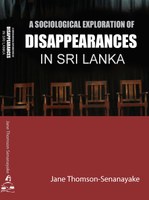 The last four decades of political violence in Sri Lanka have witnessed the enforced disappearance of tens of thousands of Sri Lankans. While much of the relevant literature has contextualised disappearance as a counter-insurgency strategy in the context of armed confrontation, the military defeat of the Liberation Tigers of Tamil Eelam (LTTE) in May 2009 did not bring about an end to the phenomenon. The hypothesis of this study is that political competition was the motive behind disappearances, which served as an integral part of a system of state power and patronage to enable the political elite to immobilise all political opposition.
The last four decades of political violence in Sri Lanka have witnessed the enforced disappearance of tens of thousands of Sri Lankans. While much of the relevant literature has contextualised disappearance as a counter-insurgency strategy in the context of armed confrontation, the military defeat of the Liberation Tigers of Tamil Eelam (LTTE) in May 2009 did not bring about an end to the phenomenon. The hypothesis of this study is that political competition was the motive behind disappearances, which served as an integral part of a system of state power and patronage to enable the political elite to immobilise all political opposition.
As a central component of this political project, disappearance enabled the ruling elite to manipulate local grievances which, when given political expression, led to greater violence in the permanent removal of local enemies whilst heightening mistrust within communities. In detailing the first disappearances in 1971 to the ceasefire agreement with the LTTE in 2002, this study considers how an alternative apparatus operated with impunity, due process was totally dismantled and Sri Lankan society became politicised and complicit with the regime, leaving survivors of political violence with no effective remedy for legal redress or common ground to demand social restoration.
Published in May 2014 by the Asian Human Rights Commission (AHRC), 341 pages, Language: English, ISBN: 978-955-4597-04-4 (Print Version) PID: AHRC-PUB-002-2014
For orders and enquiries: Email: ahrc@ahrc.asia or call +(852) 2698 6339.
Click here to download this publication in PDF format.